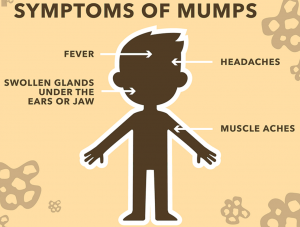In a follow-up on the mumps outbreak in New Castle County, Delaware, health officials confirmed two additional cases Friday, bringing the total to 13.

Nine of the thirteen persons with mumps attended either the Feb. 10, or March 3, 2018 social dance (Baile Mejicano) that took place at the Chase Center on the Riverfront in Wilmington. Two of the remaining four individuals live with someone who attended one of the dances, and source of the mumps virus exposure for the other two individuals is still under investigation.
The Delaware Division of Public Health (DPH) continues to recommend that anyone who attended either the Feb. 10 or March 3, 2018, dances contact their primary care physician to determine if they may have contracted mumps and if they and their family or close contacts need to receive vaccination against mumps.
Mumps is an acute viral infection spread through saliva or mucus from the mouth, nose, or throat. An infected person can spread the virus by coughing, sneezing, or talking, sharing items, such as cups or eating utensils, with others, and touching objects or surfaces with unwashed hands that are then touched by others. The Centers for Disease Control and Prevention (CDC) notes that a substantial increase in the number of mumps outbreaks and outbreak-associated cases have occurred in the United States since late 2015.
Symptoms typically start with a few days of fever, headache, muscle aches, tiredness, and loss of appetite, followed by swollen salivary glands, which results in puffy cheeks and a swollen jaw. Symptoms typically appear 16 to 18 days after infection, but can range from 12 to 25 days after infection. Some people with mumps may not have any symptoms.
People known or suspected to have mumps should stay away from school or work until five days after the onset of swollen salivary glands, as there is no specific treatment for mumps.
The CDC recommends children get two doses of MMR vaccine, starting with the first dose at 12 to 15 months of age, and the second dose at 4 to 6 years of age. Teens and adults who did not get the recommended MMR vaccines per the above schedule should be vaccinated so they are up to date. During outbreaks, CDC also recommends that those at highest risk due to exposure to people with mumps, should receive a third dose of MMR.


